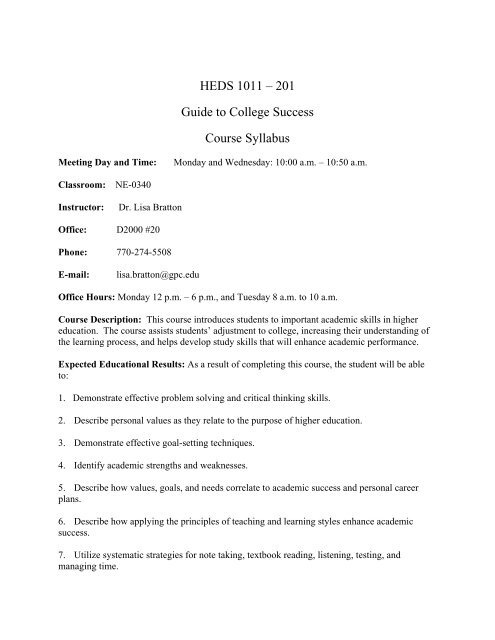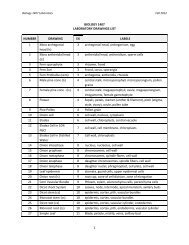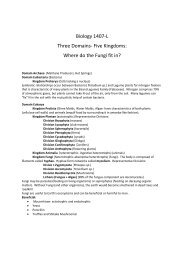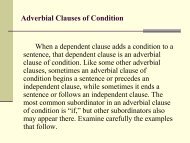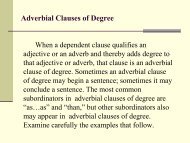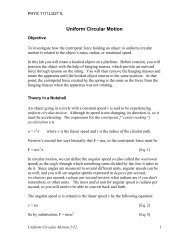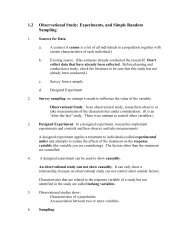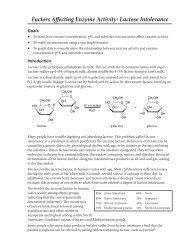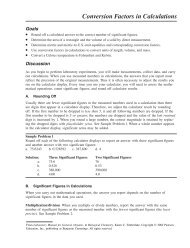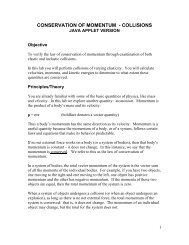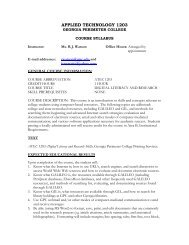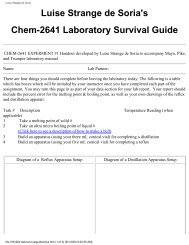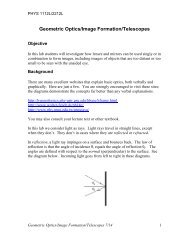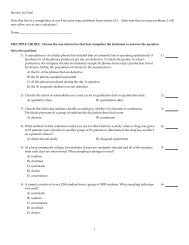HEDS 1011 - Faculty & Staff, Georgia Perimeter College
HEDS 1011 - Faculty & Staff, Georgia Perimeter College
HEDS 1011 - Faculty & Staff, Georgia Perimeter College
You also want an ePaper? Increase the reach of your titles
YUMPU automatically turns print PDFs into web optimized ePapers that Google loves.
<strong>HEDS</strong> <strong>1011</strong> – 201<br />
Guide to <strong>College</strong> Success<br />
Course Syllabus<br />
Meeting Day and Time:<br />
Monday and Wednesday: 10:00 a.m. – 10:50 a.m.<br />
Classroom: NE-0340<br />
Instructor:<br />
Dr. Lisa Bratton<br />
Office: D2000 #20<br />
Phone: 770-274-5508<br />
E-mail:<br />
lisa.bratton@gpc.edu<br />
Office Hours: Monday 12 p.m. – 6 p.m., and Tuesday 8 a.m. to 10 a.m.<br />
Course Description: This course introduces students to important academic skills in higher<br />
education. The course assists students’ adjustment to college, increasing their understanding of<br />
the learning process, and helps develop study skills that will enhance academic performance.<br />
Expected Educational Results: As a result of completing this course, the student will be able<br />
to:<br />
1. Demonstrate effective problem solving and critical thinking skills.<br />
2. Describe personal values as they relate to the purpose of higher education.<br />
3. Demonstrate effective goal-setting techniques.<br />
4. Identify academic strengths and weaknesses.<br />
5. Describe how values, goals, and needs correlate to academic success and personal career<br />
plans.<br />
6. Describe how applying the principles of teaching and learning styles enhance academic<br />
success.<br />
7. Utilize systematic strategies for note taking, textbook reading, listening, testing, and<br />
managing time.
8. Use college resources and services.<br />
9. Demonstrate involvement in college and community life.<br />
Required Text: Cornerstone: Building on Your Best (Concise 4 th Edition), Sherfield,<br />
Montgomery, and Moody. Prentice Hall. 2005<br />
Withdrawals: Withdrawals must be initiated by the student. Students will not be withdrawn for<br />
poor attendance. The last date a student can withdraw is October 13.<br />
Course Requirements and Grading: Students will be evaluated as follows:<br />
Exam 1: 10%<br />
Exam 2: 15%<br />
Final Exam: 15%<br />
In-class assignments 20%<br />
Homework Assignments 20%<br />
Symposium Lecture Write-up 10%<br />
Cultural Event/Lecture Write-up 10%<br />
Exams:<br />
100%<br />
The two exams and final exam will all be a combination of multiple-choice questions and short<br />
answers. Exam questions will come from the textbook, class notes, and in-class activities. The<br />
final exam is comprehensive and will include material from throughout the entire semester.<br />
Class Participation and Attendance:<br />
Much of this course will be conducted in a seminar format, so class participation is essential.<br />
Students must be present in order to participate in in-class activities and discussions and to turn<br />
in and receive information about future assignments. In order to receive a high participation<br />
grade, the student should come to class prepared, be actively involved in class discussions and<br />
activities, make thoughtful comments and treat other students and the instructor with respect.<br />
Disruptive and disrespectful behavior such as cell phone use, excessive tardiness, walking out<br />
during class and idle chatter, will work against a student’s participation grade. Students should<br />
turn off electronic devises before entering the classroom.
Assignments:<br />
All homework assignments listed in the syllabus (except in-class assignments) must be typed and<br />
are due on Monday or Tuesday of each week unless otherwise stated in class. Students should<br />
buy a 3-ring notebook and use tabs to keep the class assignments, activities, and notes<br />
organized.<br />
Extra Credit:<br />
Each student must attend at least one seminar in the Student Success Series<br />
(http://www.gpc.edu/~dunss/success.htm). After completing this requirement, each course<br />
attended will add two points to the student’s final grade.<br />
Cultural Event/Lecture: Students must attend an off-campus educational or cultural event and<br />
write a one-page summary/response. The student can choose which lecture/event to attend, but it<br />
must be academic- or career- related. For the budget-conscious, Creative Loafing offers a wide<br />
variety of free and low-cost events.<br />
Late Work and Make-up Exams:<br />
Students must attend class to hand in homework and receive points. Late work will be accepted<br />
ONLY if you are absent, and with a documented reason (court date, accident report, doctor’s<br />
note, etc.). Missed class activity points cannot be made up. No make-up work will be allowed<br />
except under circumstances approved by the instructor. Make-up tests will not be allowed<br />
except for documented emergencies.<br />
Final Grades:<br />
Final grades will be calculated using the <strong>Georgia</strong> <strong>Perimeter</strong> <strong>College</strong> grading scale as follows:<br />
90 – 100%: A<br />
80 – 89%: B<br />
70 – 79%: C<br />
60 – 69%: D<br />
below 60%: F
PROPOSED COURSE SCHEDULE<br />
Week 1:<br />
Chapter 1: Change<br />
Introduction, Discussion of Course Objectives<br />
DUE: Self-Assessment for Chapter 1 (pp. 6-7)<br />
Note: For this week only! This assignment is due on Wednesday/Thursday. For the rest of the<br />
semester, assignments are due on Monday or Tuesday unless otherwise stated in class.<br />
Week 2:<br />
Chapter 1 Change (cont'd.) and Chapter 2: Grow<br />
DUE: The Change Implementation Model: (p. 23-24)<br />
Week 3:<br />
Chapter 3: Persist<br />
DUE: Visit your academic advisor and one of <strong>Georgia</strong> <strong>Perimeter</strong>'s on-campus services (see<br />
pp. 71-72 for appropriate options) and write a one-page summary (each) of your<br />
two experiences.<br />
Week 4:<br />
Chapter 4: Prioritize<br />
DUE: Complete the budget exercise on page 118-119. Write at least a paragraph on the<br />
benefits and challenges of living within your budget. What changes, if any, should you<br />
make What budget items are non-negotiable Comment on your overall fiscal health.<br />
Week 5:<br />
Chapter 5: Read<br />
DUE: Take notes on a chapter in a textbook you have for another class (IF this is your only<br />
class, use Chapter 6). You may use any of the methods mentioned in the textbook.<br />
Week 6:<br />
Chapter 6: Learn<br />
DUE: Personality Assessment Profile p. 186<br />
Week 7:<br />
Chapter 7: Listen<br />
DUE: Write a paragraph about a person you know who is a great listener. Write a<br />
paragraph about a person you know who is a poor listener. Compare and contrast why<br />
you characterize them as such. What type of listener are you How can you best improve<br />
your listening skills<br />
Week 8:<br />
Chapter 8: Record and Chapter 9: Remember<br />
DUE: Prepare an outline for a research paper on a topic in your intended major OR watch<br />
a 30- or 60- minute show on PBS and take accurate notes.
Week 9:<br />
Chapter 10: Assess<br />
DUE: Write a page on how you prepare for tests. What strategies from the text can you<br />
use to improve your study skills What strategies will not work for you Explain your<br />
answers.<br />
WEEK 10:<br />
Chapter 11: Think<br />
DUE: Consider a problem you are currently facing. Use the problem-solving concepts in<br />
the text and write how you can creatively or critically solve this problem OR develop a 5-<br />
step plan using the information on page 315.<br />
Week 11:<br />
Chapter 12: Communicate<br />
DUE: Write a well analyzed, persuasive answer to one of the four bulleted questions on<br />
Page 313. You can choose the length of this assignment--just be sure your argument is<br />
persuasive and sound.<br />
Extra Credit: Use the ten steps and other helpful information in the text to develop a wellprepared<br />
and well-presented speech. This exercise is limited to the first five students to<br />
come by my office and register with me in person. This exercise can earn up to ten points<br />
added to your final grade.<br />
Week 12:<br />
Chapter 13: Relate<br />
DUE: Interview a person who is a different race, ethnicity or religion from you. Try to find<br />
someone who is as "different" from you as possible. Ask the questions on Pages 385 -<br />
387 and at least three more that you create. Write one page about what you learned about<br />
that person and his or her race/ethnicity/religion...<br />
Week 13:<br />
Chapter 14: Live<br />
DUE: Make at least one healthy change in your life and maintain that practice for least<br />
two days. Choose something that has been a challenge to you for at least six months.<br />
(Examples include: no smoking, taking the stairs, no meat/candy/fast food...) Write a page<br />
about how that made you feel.<br />
Activity: Actions Plan for Wellness p. 429<br />
Week 14:<br />
Chapter 15: Dream
Due: Interview your mentor. If you do not have a mentor, identify someone you would like<br />
to have as a mentor. List three academic or career-related questions you have and ask that<br />
individual their opinion on how best to handle them. Write at least one page on this<br />
experience and what you learned from your mentor.<br />
Week 15:<br />
Semester wrap-up and final exam prep<br />
Comprehensive Final Exam: December 8 from 10:30 a.m. – 12:30 p.m.<br />
Revisions to Course Schedule, Due Dates, and Exam Dates:<br />
Although the instructor will attempt to adhere to the course schedule, it is impossible to predict<br />
with complete accuracy the pace at which the class will proceed through the course material.<br />
Revisions to the schedule may also be necessary to accommodate the schedules of guest<br />
speakers. The final exam date will not change.<br />
Academic Honesty (Cheating/Plagiarism) Policy:<br />
Cheating is against school policy. Cheating includes any attempt to defraud, deceive, or mislead<br />
the instructor in arriving at an honest grade assessment, and may include copying answers from<br />
other students or using unauthorized notes during tests. Plagiarism is a particular form of<br />
cheating that involves presenting as one's own the ideas or work of another, and may include<br />
using other people's ideas without proper attribution and submitting another person's work as<br />
one's own. Violations of the cheating policy will result in a grade of '0' for the assignment in<br />
question, and may result in a failing grade for the course at the instructor's discretion. See the<br />
Student Conduct Code in the Student Handbook for details and for a review of the appeals<br />
procedure. Additional information related to Academic Honesty as it applies to courses taken in<br />
the Department of Social Sciences on the Dunwoody Campus may be found on our website at<br />
http://www.gpc.edu/~bbrown/socialsciences/academichonesty.htm.<br />
Americans With Disabilities Act Statement:<br />
If you are a student who is disabled as defined under the Americans with Disabilities Act<br />
and requires assistance or support services, please seek assistance through the Center<br />
for Disability Services. A CDS Counselor will coordinate those services.<br />
Statement Of Non-Discrimination:<br />
<strong>Georgia</strong> <strong>Perimeter</strong> <strong>College</strong> supports the Civil Rights Act of 1964, Executive Order<br />
#11246, Title IX of the Educational Amendments of 1972, Section 504 of the<br />
Rehabilitation Act of 1973, and the Americans with Disabilities Act. No person shall, on<br />
the basis of age, race, religion, color, gender, sexual orientation, national origin or<br />
disability, be excluded from participation in, or be denied the benefits of, or be subjected<br />
to discrimination under any program or activity of the college.
Any individual with a grievance related to the enforcement of any of the above<br />
provisions should contact the Assistant Director of Human Resources, Ombudsperson.<br />
Affirmative Action Statement:<br />
<strong>Georgia</strong> <strong>Perimeter</strong> <strong>College</strong> adheres to affirmative action policies to promote diversity<br />
and equal opportunity for all faculty and students.<br />
The Regents’ Test:<br />
The University System of <strong>Georgia</strong> requires that all students enrolled in undergraduate<br />
degree programs in University System institutions (including <strong>Georgia</strong> <strong>Perimeter</strong> <strong>College</strong>)<br />
successfully complete all parts of a competency examination in reading and English<br />
composition. This competency examination is commonly called “the Regents’ Test”,<br />
and it is free of charge. A student has two attempts to pass this test before<br />
accumulating 45 hours of collegiate credit. Please sign up for the Regents’ Test when<br />
you enroll in English 1102. Do this in time to have two attempts before accumulating 45<br />
credit hours!


